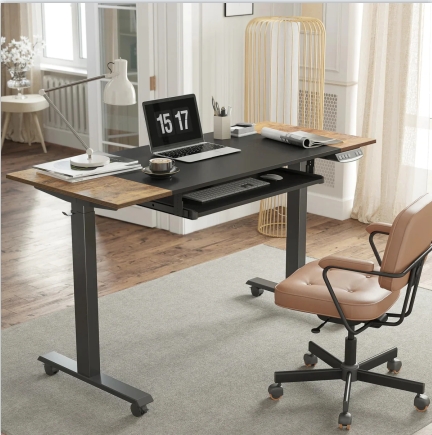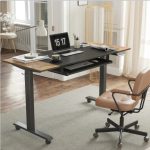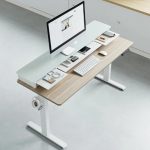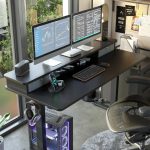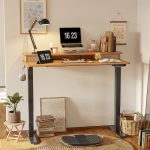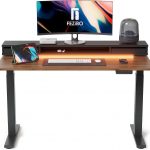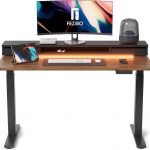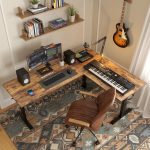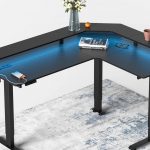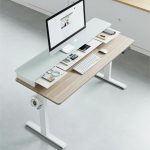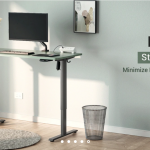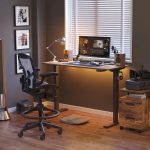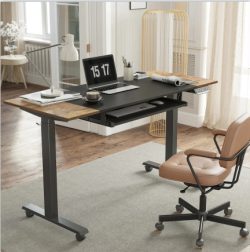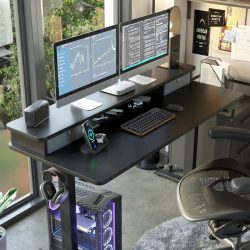What Types of Standing Desks Are There?
Standing computer desk are more than just a trend; they have become a staple in modern workspaces due to their ability to promote better health, improve posture, and enhance productivity. With growing awareness about the dangers of prolonged sitting, standing desks offer a practical solution that caters to diverse needs and preferences. In toda’s market, there are various types of standing desks, each tailored to specific requirements, from simple setups to high-tech, customizable solutions.
This guide will explore the main types of standing desks available, highlighting their features, benefits, and ideal use cases to help you make an informed decision.
1. Manual Best Standing Desk
Manual standing desks are the most basic form of adjustable desks. These desks use a hand crank or a counterbalance mechanism to adjust their height. They are often chosen for their simplicity, affordability, and lack of reliance on electricity.
Durable: Fewer electrical components mean less risk of malfunction.Eco-Friendly: No electricity required, reducing energy consumption.Drawbacks
Effort Required: Adjusting the height manually can be inconvenient, especially for frequent transitions.
Limited Features: Usually lacks advanced features like memory presets or integrated cable management.Ideal For: Budget-conscious users or those who prefer a simple, low-maintenance desk.
Electric standing desks are the most popular choice for modern workspaces due to their convenience and advanced features. These desks are powered by electric motors that allow smooth and effortless height adjustments at the touch of a button.
Precision: Smooth and consistent adjustments for ergonomic perfection.Customizable: Many models offer additional features like programmable heights or advanced stability.Drawbacks
Cost: More expensive than manual models.
Power Dependency: Requires electricity, which might be a limitation in areas with unreliable power.Ideal For: Professionals who frequently switch between sitting and standing positions or those seeking a premium experience with advanced features.
3. Stand up desk Converters
Desk converters are a practical solution for those who want the benefits of a standing desk without replacing their existing desk. These devices sit on top of your current desk and can be adjusted to raise your monitor and keyboard to a standing position.
Easy Setup: Requires minimal assembly and can be moved between desks.Space-Saving: Ideal for smaller workspaces or shared environments.Drawbacks
Limited Space: Smaller surface area compared to full desks.
Stability: Depending on the quality, some converters may wobble when raised.Ideal For: Users who already have a desk and want a portable, cost-effective standing solution.
L-shaped standing desks, also known as corner desks, provide a spacious work surface for professionals with multiple monitors or extensive setups. These desks maximize workspace while offering the flexibility of height adjustability.
Large surface area with an L-shaped or corner configuration.
Available in manual, electric, or hybrid adjustment options.Supports heavier loads and larger equipment setups.Benefits
Efficient Design: Fits neatly into corners, optimizing office layouts.Premium Features: Many models include advanced motor systems, memory presets, and cable management.Drawbacks
Space Requirements: Requires a larger area to accommodate the desk.Ideal For: Designers, gamers, or professionals with multi-monitor setups who need a spacious, ergonomic workstation.
5. Compact Height Adjustable Desk
Compact standing desks are designed for small spaces, such as home offices, dorm rooms, or apartments. These desks offer basic height adjustability in a smaller footprint.
Affordable: Generally less expensive than larger models.Portable: Easy to reposition or store when not in use.Drawbacks
Limited Workspace: Smaller surface area restricts equipment and supplies.
Weight Capacity: May not support heavier setups.Ideal For: Students, remote workers, or anyone with limited space who still wants the health benefits of a standing desk.
6. Fixed Standing desk small
Fixed standing desks are non-adjustable desks designed specifically for standing. These are a simple and affordable option for individuals who prefer to work standing full-time or use a separate sitting workstation.
Minimalistic design with no moving parts.Sturdy and reliable construction.Benefits
Cost-Effective: One of the most affordable standing desk options.
Durable: Simple design ensures long-lasting use.No Adjustments Needed: Ideal for those who exclusively work standing.Drawbacks
Lack of Flexibility: Cannot be adjusted for sitting, limiting versatility.
Ergonomic Limitations: Requires precise height matching to the user’s body for comfort.Ideal For: Standing desk enthusiasts or individuals who have separate workstations for sitting.
Treadmill desks combine a standing desk with a treadmill, enabling users to walk while working. These desks are designed for people who want to stay active and boost their physical activity during the workday.
Adjustable desk height to accommodate walking or standing.Speed controls and safety features for the treadmill.Benefits
Promotes Movement: Encourages physical activity during work hours.
Health Benefits: Helps burn calories and improves circulation.Productivity Boost: Many users report increased focus and energy.Drawbacks
Space Requirements: Requires more room than standard standing desks.Noise: Treadmill operation may be disruptive in quiet environments.Ideal For: Health-conscious professionals who want to integrate exercise into their work routine.
Hybrid standing desks combine multiple functionalities, such as a sit-stand mechanism with additional storage, foldable designs, or convertible setups. These desks are designed to offer maximum versatility.
Combines standing desk functionality with additional features like drawers or foldable parts.Can be manual or electric.Multi-use design for small or dynamic workspaces.
Versatility: Great for users who need flexibility in a single piece of furniture.Compact Options: Some models can be folded or reconfigured to save space.Multi-Purpose: Ideal for homes where space doubles for work and leisure.
Complexity: May require more assembly or maintenance.Price Variation: Hybrid features can increase costs.Ideal For: Users with dynamic work environments or who want a multifunctional desk.
The range of standing desks available in 2024 ensures that there’s an option for every workspace, budget, and lifestyle. From basic manual models to high-tech electric versions and multifunctional hybrids, each type of standing desk offers unique advantages. Choosing the right desk depends on your specific needs, including workspace size, budget, and how frequently you plan to switch between sitting and standing.
By understanding the various types of standing desks, you can make an informed decision and invest in a solution that enhances your comfort, health, and productivity for years to come.
The benefits of ergonomic office chair go far beyond just comfort—they are a critical investment in your long-term health, productivity, and overall well-being. By providing the right support for your spine, neck, shoulders, and arms, ergonomic chairs reduce pain, improve posture, and encourage better circulation, all of which contribute to a healthier, more comfortable working environment.
Whether you’re working from home or in a traditional office setting, an ergonomic chair is one of the most important pieces of furniture you can invest in. It promotes comfort, reduces the risk of injury, and enhances productivity, making it an essential tool for anyone who spends long hours sitting.
